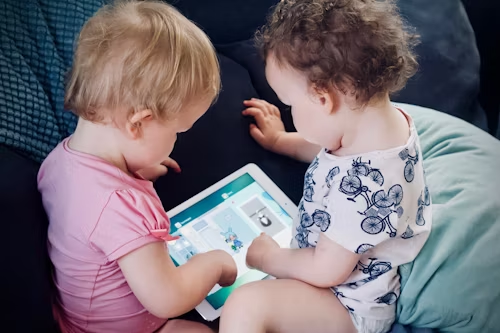Many twins develop unique ways to communicate, with studies suggesting that up to 50% create their own language or communication pattern. While most outgrow it, the Youlden twins, Matthew and Michael, have turned their shared language into a lasting bond.
The twins each speak 25 languages, but their 26th, Umeri, is one they don’t count among them. Umeri is a language they created together as children, and remarkably, they are its only speakers.
They emphasize that Umeri isn’t a secret language. “It’s not used to keep things private,” they explain via email. “It holds sentimental value and reflects the deep connection we share as identical twins.”
Estimates suggest that 30-50% of twins develop a private language, known as cryptophasia—Greek for “secret speech.” Nancy Segal, director of the Twin Studies Center at California State University, prefers the term “private speech” and describes it as a form of shared verbal understanding unique to each pair. “Based on available studies, about 40% of twin toddlers engage in some form of ‘twin-speak,’” she notes, although the true complexity of their language development often goes unrecognized.
Roy Johannink, father of teenage twins Merle and Stijn, recorded a video of them babbling together when they were babies, which has since garnered over 30 million views on YouTube. He recalls the moment fondly: “They saw each other and thought, ‘I’m not alone; there’s another one of me!’”
Segal points out that, like Merle and Stijn, many twins lose their shared language as they learn to communicate with the outside world. However, for the Youlden twins, their language not only endured but flourished over the years.
Growing up in Manchester, UK, Matthew and Michael were immersed in diverse cultures, which sparked their interest in languages. They have vague memories of Umeri’s inception, recalling their grandfather’s confusion when they shared jokes he couldn’t understand. Their first family holiday abroad at age eight, where they decided to learn Spanish to order ice cream, marked a turning point. With a dictionary in hand, they translated phrases directly, which eventually led them to explore Italian and Scandinavian languages. This blend of linguistic elements helped them realize that Umeri could evolve into a fully developed language.
According to Segal, “Twins don’t invent a new language; they produce atypical forms of the languages they hear.” The Youlden twins began to standardize Umeri and even attempted to create their own alphabet, only to find that it was impractical without a specific font. Today, Umeri is written using the Latin alphabet.
However, maintaining a rare language has its challenges. Matthew notes, “Twins often stop using their shared language out of a sense of shame.” He adds that this isn’t unique to twins—speakers of minority languages often feel self-conscious. Fortunately, the Youldens received no negative reactions from their parents or peers. “When we spoke Umeri around family, the response was usually, ‘They’re off doing their language thing again,’” Matthew recalls.
Karen Thorpe, a child development specialist at the Queensland Brain Institute, has researched language development in twins. She views private language as a testament to the close bonds shared between individuals. “It’s a beautiful aspect of human connection,” she says. While not exclusive to twins, such language development is more common among those with strong ties.
For the Youlden twins, their language is a mix of intimacy and intellectual curiosity, though Thorpe notes that this conscious, long-term development is rare. Case studies on cryptophasia, such as those of June and Jennifer Gibbons—twins who grew up in Wales and spoke only to each other—illustrate the complexities involved. Their shared language led to isolation, culminating in their stay at a high-security psychiatric hospital.
Most twins do not retain a unique language as they grow up, but some may remember specific words or gestures. “They may not have an exclusive language, but they possess something special,” Thorpe says. Research indicates that twins are slightly more prone to language delays, not necessarily due to their private language but rather from less individual adult interaction.
Matthew and Michael have had a positive experience with Umeri, which continues to evolve as they invent new words for modern concepts. “Words like ‘iPad’ or ‘lightning cable’ didn’t exist 20 or 30 years ago,” Matthew notes.
Now, the twins run a language coaching company, helping individuals and institutions learn new languages. While Michael resides in Gran Canaria and Matthew in the Basque Country, they continue to communicate in Umeri.
However, they don’t plan to pass down their language to any future children, finding it odd to share Umeri with others. “It’s a unique language spoken by just two people,” Michael reflects. “It has an expiry date.”
